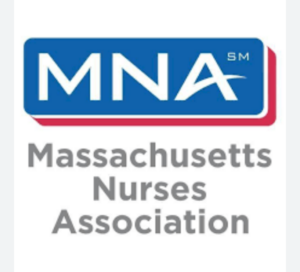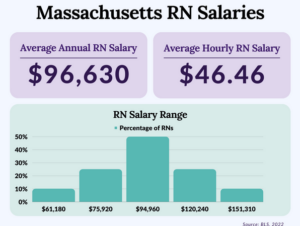Massachusetts Nursing License Requirements
 Massachusetts is a prime location for both experienced and aspiring nurses, with approximately 84,000 registered nurses (RNs) actively contributing to the state’s healthcare system, according to the U.S. Bureau of Labor Statistics (BLS).
Massachusetts is a prime location for both experienced and aspiring nurses, with approximately 84,000 registered nurses (RNs) actively contributing to the state’s healthcare system, according to the U.S. Bureau of Labor Statistics (BLS).
The state is ranked among the highest-paying locations for RNs, securing the third position in terms of the highest mean salary.
For those interested in pursuing a nursing career in Massachusetts, this guide covers everything you need to know about becoming a nurse in the state, including essential steps, education, licensure, job prospects, and salary information.
Steps to Become a Registered Nurse in Massachusetts
Becoming a nurse in Massachusetts involves several key steps: earning a degree, passing the NCLEX-RN exam, applying for licensure, gaining experience, and finding employment. Below are the steps you need to take:

Struggling to meet your deadline?
Get your assignment on Massachusetts Nursing License Requirements done by certified MDs and PhDs in the USA. ORDER NOW!
Earn Your Degree (ADN or BSN)
To become a nurse in Massachusetts, you must first earn a degree from an accredited nursing program. You can choose between an Associate Degree in Nursing (ADN) or a Bachelor of Science in Nursing (BSN). Both degrees allow you to sit for the NCLEX-RN exam, but BSN vs ADN in Massachusetts has significant career implications. BSN programs typically offer more in-depth education and open up more advanced career opportunities. For instance, nurses with a BSN may be more likely to qualify for roles in leadership, management, or specialized fields.
Pass the NCLEX-RN Exam
After completing your nursing degree, you must pass the NCLEX in Massachusetts to become licensed. The National Council Licensure Examination for Registered Nurses (NCLEX-RN) evaluates your readiness to provide safe and effective care in professional nursing roles. Upon passing, you can apply for your Massachusetts RN licensure.
Apply for Your Massachusetts RN License
Once you’ve passed the NCLEX-RN, you can apply for your RN license in Massachusetts. You’ll need to submit your application, pay the necessary fees, and provide any required documentation. New nurses can apply for licensure by examination, while nurses from other states can apply for nurse licensure by reciprocity. Nurses applying from outside Massachusetts who are licensed in another state may not need to retake the NCLEX-RN, but they must meet Massachusetts-specific requirements.
Gain Experience and Apply for Jobs
After receiving your Massachusetts nursing license, you can begin seeking employment in hospitals and healthcare facilities across the state. Hospitals hiring nurses in Massachusetts frequently offer competitive salaries and benefits to attract qualified nurses. You can leverage connections with educational institutions or professional associations to strengthen your job applications.
Nursing Salary and Job Outlook in Massachusetts
Nurses in Massachusetts enjoy competitive salaries and a positive job outlook. The average salary for RNs in Massachusetts is $96,250 per year, according to BLS data. In areas like Boston-Cambridge-Nashua, the mean salary is even higher, reaching $99,410.
Average Salary for RNs in Massachusetts
Massachusetts is one of the highest-paying states for nurses, with a strong job market and a high demand for skilled healthcare professionals. The registered nurse salary in Massachusetts reflects the state’s commitment to supporting its healthcare workforce.
Top-Paying Cities for Nurses in Massachusetts
The Boston-Cambridge-Nashua area has the highest RN salaries in Massachusetts, but other cities like Worcester, Leominster-Gardner, and Barnstable Town also offer competitive salaries for RNs, often exceeding $80,000 annually.
Top Nursing Schools and Programs in Massachusetts
Massachusetts is home to some of the best nursing programs in Massachusetts, with numerous universities and colleges offering both ADN and BSN programs. Whether you’re looking to earn an associate degree or a bachelor’s degree, there are several options available to help you start your nursing career.
Best RN Programs in Massachusetts
Some of the best nursing programs in Massachusetts include those offered by schools like Boston College, the University of Massachusetts, and Northeastern University, all of which are known for their excellent nursing education and clinical experiences. These programs ensure that students are well-prepared for the NCLEX-RN in Massachusetts.
BSN vs ADN Programs in Massachusetts
In Massachusetts, you can choose between ADN programs, which typically take two years to complete, or BSN programs, which take four years. While both degrees lead to licensure as a registered nurse, the BSN vs ADN in Massachusetts comparison is important to consider based on your career goals. Nurses with a BSN may have more opportunities for advanced positions, higher pay, and roles in management or education.
Nursing Licensure Requirements in Massachusetts
Nurses in Massachusetts must meet specific requirements to obtain and maintain their licenses. These include completing an accredited nursing program, passing the NCLEX-RN, and completing continuing education for license renewal.
New Nurse Licensure by Exam
New nurses must pass the NCLEX-RN exam after earning their degree. After passing, they can apply for an RN licensure Massachusetts through the Massachusetts Board of Nursing.
Out-of-State Nurse Licensure by Reciprocity
Nurses from other states can apply for licensure in Massachusetts through licensure by reciprocity, provided they meet the state’s requirements, including verification of their current license and educational credentials. Since Massachusetts is not a member of the Nurse Licensure Compact (NLC), nurses applying via reciprocity must follow specific guidelines to practice in the state.
Renewing Your Nursing License in Massachusetts
Massachusetts requires RNs to renew their licenses every two years. To renew your license, you must complete 15 hours of continuing education, which can include workshops, college courses, or online nursing continuing education in Massachusetts. Renewal costs $120.
Massachusetts Board of Nursing
The Massachusetts Board of Nursing is the regulatory body that oversees the licensure and practice of nurses in the state. It is responsible for issuing and renewing nursing licenses, as well as ensuring nurses meet the state’s education and practice standards. The board’s website is a helpful resource for all Massachusetts nursing license renewal and other licensure-related questions.
Nursing Job Prospects in Massachusetts
The job prospects for nurses in Massachusetts are excellent, with an 8.2% growth in nursing employment projected from 2018 to 2028. Massachusetts nursing employment outlook is positive, reflecting the state’s strong healthcare sector and a growing need for skilled nursing professionals.
Hospitals Hiring Nurses in Massachusetts
Hospitals hiring nurses in Massachusetts offer ample opportunities for newly licensed RNs, as well as experienced professionals. Massachusetts hospitals like Massachusetts General Hospital and Brigham and Women’s Hospital are known for offering competitive salaries and benefits.
Nursing Continuing Education in Massachusetts
Nurses in Massachusetts are required to complete continuing education to maintain their licensure. To renew your RN license, you must complete 15 contact hours of continuing education every two years. These hours can be earned through workshops, online nursing education, college courses, or other approved programs.
Massachusetts Nursing Certification Programs
In addition to general licensure, nurses in Massachusetts can pursue additional nursing certification programs in specialties like critical care, pediatrics, or oncology. Pursuing certifications can lead to career advancement, higher earning potential, and a greater variety of job opportunities.
Nursing Papers, Assignments, and Research
If you’re pursuing a nursing degree or continuing your education in Massachusetts, you may need assistance with nursing assignments, nursing exams, or nursing research. There are online nursing papers and custom nursing papers services available to help students with writing nursing essays or completing research papers. Whether you’re looking for the best nursing papers, top nursing essays, or need help with academic writing, these services can support your educational journey.
In conclusion, Massachusetts offers excellent opportunities for both new and experienced nurses. With competitive salaries, a strong job outlook, and numerous educational programs, the state remains one of the best places for nurses to start or advance their careers. Whether you’re seeking RN licensure Massachusetts, continuing education, or employment, Massachusetts provides a supportive environment for nurses to thrive.
Top-Paying Metropolitan Areas for RNs
| Metropolitan Area | Mean Annual Salary |
|---|---|
| Boston — Cambridge — Nashua | $99,410 |
| Leominster — Gardner | $89,360 |
| Worcester | $88,470 |
| Barnstable Town | $88,210 |
| New Bedford | $83,020 |
Source: BLS
Best Hospitals to Work as a Nurse in Massachusetts
Top Hospitals for Nursing Employment in Massachusetts
The selection of hospitals presented here, each employing a workforce of no less than 1,500 nurses, is derived from the Best Hospitals in Massachusetts list by U.S. News & World Report. This ranking considers various factors such as patient outcomes and the quality of care provided.
1. Massachusetts General Hospital (MGH):
– Location: Boston
– Description: MGH functions as a comprehensive medical and surgical facility. Established in 1811, this teaching hospital maintains a strong affiliation with Harvard University. Apart from its clinical services, MGH actively engages in medical research, overseeing around 1,200 clinical trials.
2. Brigham and Women’s Hospital (BWH):
– Location: Boston
– Description: Also aligned with Harvard University, BWH is a renowned teaching hospital that includes a women’s health center. Beyond its primary care and emergency services, the hospital specializes in areas such as oncology and surgery. Recognized with Magnet recognition, approximately 3,500 nurses contribute in clinical and leadership roles at BWH.
3. Beth Israel Deaconess Medical Center (BIDMC):
– Location: Boston
– Description: As part of Beth Israel Lahey Health, BIDMC, another Harvard teaching hospital in Boston, encompasses diverse departments, including emergency services featuring a level I trauma center. With approximately 3,000 nurses, 92% of whom hold bachelor’s, master’s, or doctoral degrees, BIDMC supports academic advancement by awarding about $130,000 in scholarships annually.
4. Lahey Hospital and Medical Center:
– Location: Burlington
– Description: Serving about 3,000 patients daily, Lahey, a nonprofit teaching hospital affiliated with Tufts University, provides comprehensive inpatient, outpatient, and emergency care. The hospital is staffed by approximately 1,500 nurses, nursing assistants, and medical assistants.
5. UMass Memorial Medical Center:
– Location: Worcester
– Description: Affiliated with the University of Massachusetts, this Worcester-based hospital serves the community through research, teaching, and medical services. With offerings like a level I trauma center and a level III neonatal intensive care unit, UMass Memorial Medical Center employs around 2,500 nurses.
Resources for Nurses in Massachusetts:
– Massachusetts Board of Nursing:
– Role: As the state’s regulatory body, the board oversees licensure for nursing practice. Candidates apply for licensure through the board, and working nurses can renew their licenses through this entity. The board’s website provides comprehensive information on education, experience, and exam requirements.
– Massachusetts Nurses Association (MNA):
– Role: Operating as both a professional organization and a nursing union, MNA boasts 23,000 members. Members benefit from informative talks, access to continuing education materials, and opportunities for collective action to promote the interests of the nursing profession in the state legislature.
– American Nurses Association Massachusetts (ANAMass):
– Role: ANAMass offers a variety of resources, including a career center, journal subscriptions, and continuing education webinars. Members can participate in the advocacy arm of ANAMass, influencing legislative and policy agendas for nursing and healthcare in the state.
Frequently Asked Questions:
1. How long does it take to get a nursing license in Massachusetts?
– Students in associate degree programs typically obtain their nursing licenses in two years, while bachelor’s degree enrollees usually take four years. Part-time enrollment may extend the licensure timeline by an additional year or two.
2. How much does a Massachusetts nursing license cost?
– The cost of a Massachusetts nursing license varies based on the application method. Candidates applying by taking the NCLEX-RN exam pay an application fee of $230, while out-of-state nurses applying by reciprocity incur a $275 fee.
3. Is MA a nursing compact state?
– Massachusetts does not participate in the Nurse Licensure Compact (NLC). Nurses moving to Massachusetts from other states must apply through reciprocity, meeting specific requirements set by the state.
4. How do I apply for the NCLEX in MA?
– To apply for the NCLEX exam in Massachusetts, candidates need to apply for licensure through the Massachusetts nursing board. Subsequently, they can register for the NCLEX with Pearson Vue either online or via telephone.

Dont wait until the last minute.
Provide your requirements and let our native nursing writers deliver your assignments ASAP.

